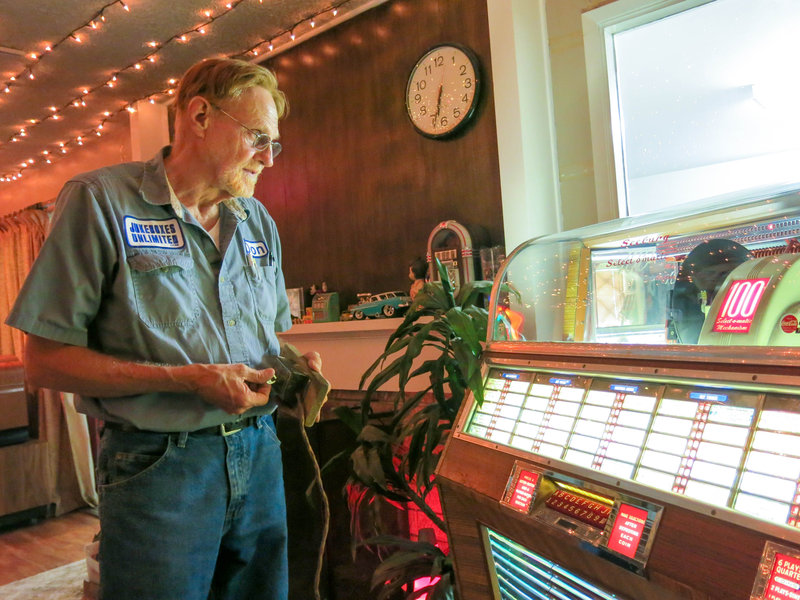
Turning the Page
Storied Jukebox Restoration Company Approaches 50 Years As Owner Looks to Pass the Torch
With nearly 50 years in the jukebox industry, Don Muller, owner of Jukeboxes Unlimited, is ready to sell his business – but it’s certainly not for lack of passion or interest from buyers. At age 77, he says it’s simply time to make some changes.
Back in 1971, Muller went by the name Don Daro as the program director and afternoon disc jockey at a radio station in Phoenix. He initially founded Jukeboxes Unlimited as a means to buy his own radio station. That didn’t pan out, but what started as a hobby out of his living room turned into stores and repair facilities that focused on fixing and selling jukeboxes, pinball machines, pool tables, video games and more.
As you might imagine, someone with that many years in the business has plenty of stories to tell. The biggest challenge in telling the story of Don and Jukeboxes Unlimited is that there are WAY too many stories to tell. As he prepares to sell his business and move on to the next chapter, RePlay had the good fortune of connecting with him to learn more.
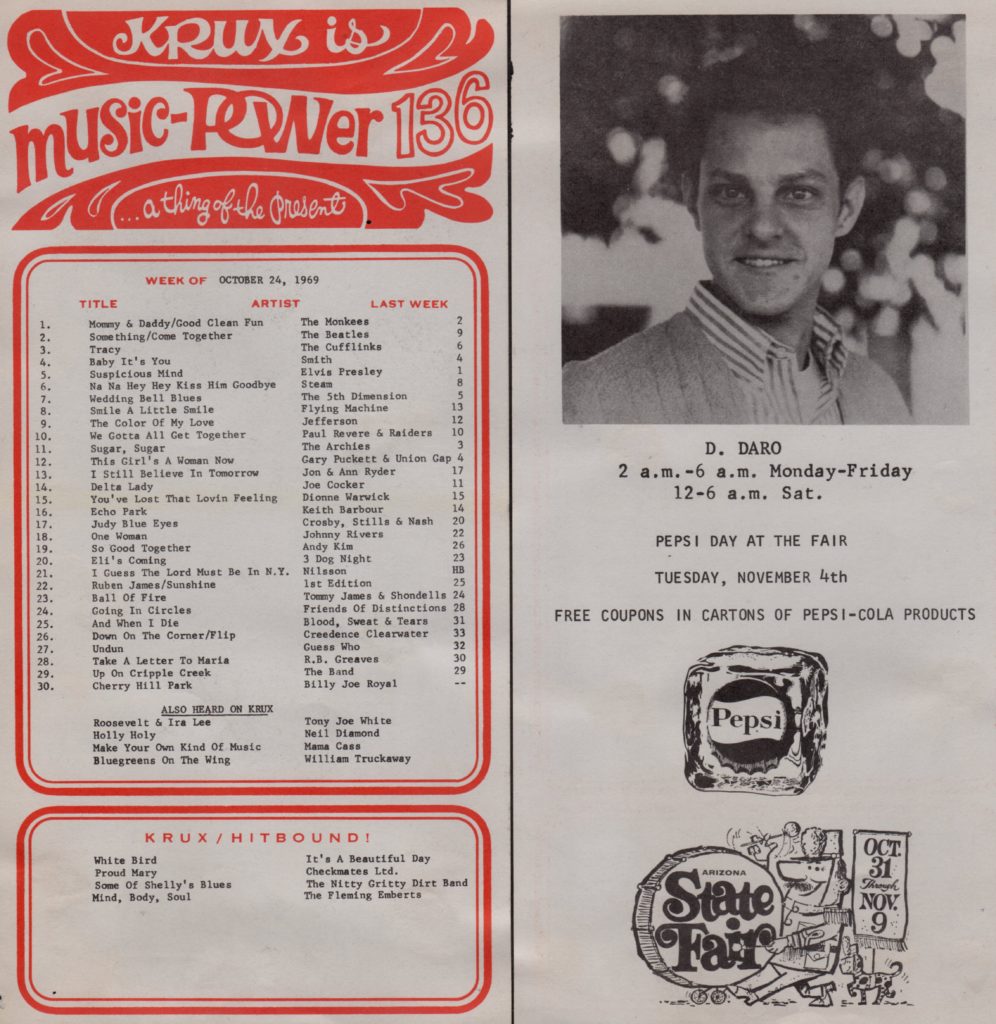
What prompted you to start Jukeboxes Unlimited?
I had worked at 11 radio stations and was running the #1 station in Phoenix, but I thought I could do better radio if I had full control. But, radio stations aren’t cheap. I had to devise a business model I could build up and sell.
Meanwhile, I loved seeing people have fun and they told me I always had the best parties. Playing music for dancing was always a challenge. I’d use reel-to-reel tapes rotating the tempo and era of the music, but felt the guests would like to pick their own. I thought that the only way that could happen would be if I had a jukebox. So, I found an operator who rented me an AMI F-120 and an old Chicago Coin pinball machine. Everyone said that was the best party ever.
It turns out that was my ticket to buying a radio station. I went out and bought my first 40 jukes from an operator in Prescott, Ariz., and after running a TV commercial for my services late at night, I knew I was on to something. The phones rang all night long. And the rest is history!
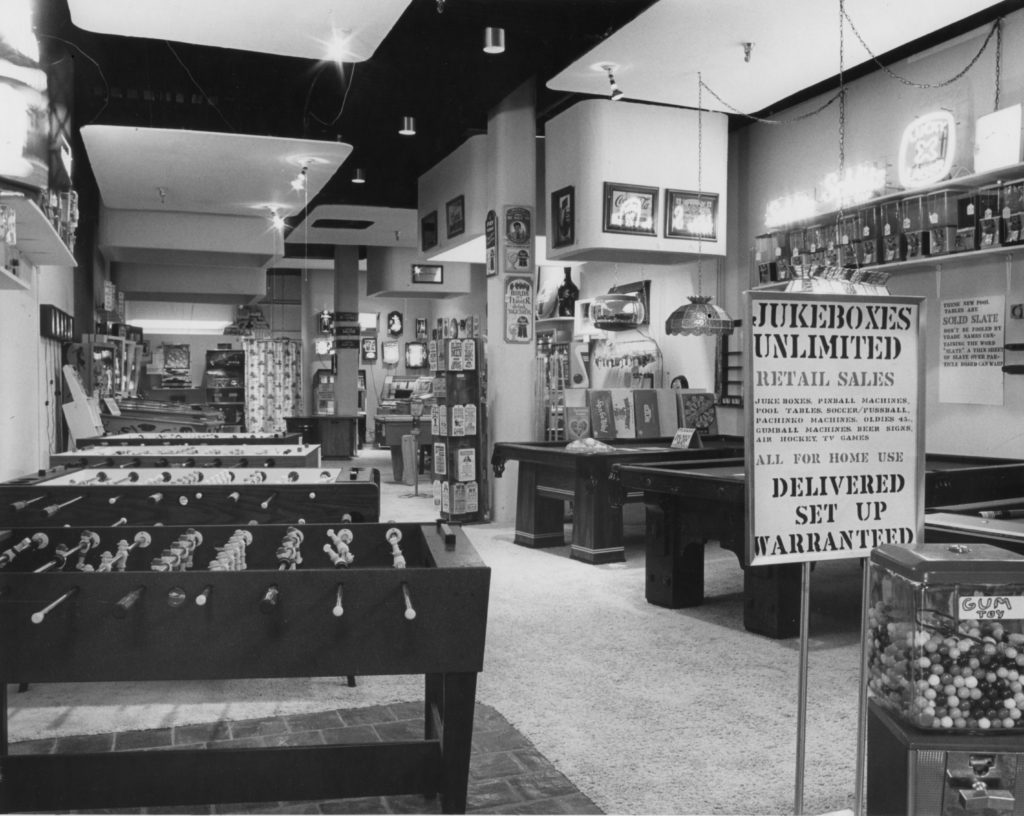
You primarily sell rebuilt and restored jukeboxes to consumers. How was the collector’s market when you started versus now, and where do you see it heading?
I learned early on that I didn’t want to have a thing to do with collectors. They were too picky. It would seem there were lots of collectors once I brought attention to jukes for homeowners. I sell to the average guy on the street and the rich and famous. I have a client with a ranch who has what might be a $100,000-plus sound and entertainment system. Out in the stables with the horses, you can punch a button and hear 78 rpm records coming from a 1941 Wurlitzer 850 in the main house.
I ask my buyers: “What in the heck do you want a jukebox for if you can have 500,000 tunes on your smartphone?” The most common answer is: “I love music and I’ve always wanted a jukebox, so now I’m gonna buy one! And seems like you’re the guy I want to buy it from.”
I would imagine jukes will always be collectible, but the collectors will diminish over the years, yet never go away completely. Like old Harleys and Coke machines, jukeboxes are in our American blood as well as the rest of the world. Nearly all cultures in the world love jukeboxes.

What about your experiences with operators. Any colorful stories to share?
When I started this business back in the summer of 1971, it got mixed reactions from both operators and distributors in my state of Arizona. Distributors liked the idea of me taking jukes out of circulation and not having to take them in on trade to store, repair and sell again with little wiggle room to make a profit. It also put my new money in the operators’ hands.
Most operators came around to what I did once they met me. They also liked the idea of the old jukes being taken out of the equation forever since I promised I’d not sell them to young upstart operators and that I’d remove the coin systems.
In some cases, they’d sabotage them before selling them to me. Like the guy who sold me a handful of 1955/56 Seeburg V200/Vl200s. He had removed the arm connecting a set of contacts to a solenoid assembly up on the right side of the mechanism chassis that tells the mech when it’s time to go rest. If you forgot, it was termed the “scan control.” Having only worked on the simple AMIs up to that time it took me a little while to figure out what was wrong. When I did, I just fabricated an arm and went on my merry way.
A few months later I ran into him at the parts counter of Garrison Sales, the biggest distributor in Arizona. With a coy smile he asked how I did with the Seeburgs. I nonchalantly smiled back looking at him for just a second before turning away and saying, “I did good although there was a small part missing but that was simple to make.” Then he asked what I sold the jukes for and I told him $125. I never looked over at his response. I had paid him $7 each two months before.
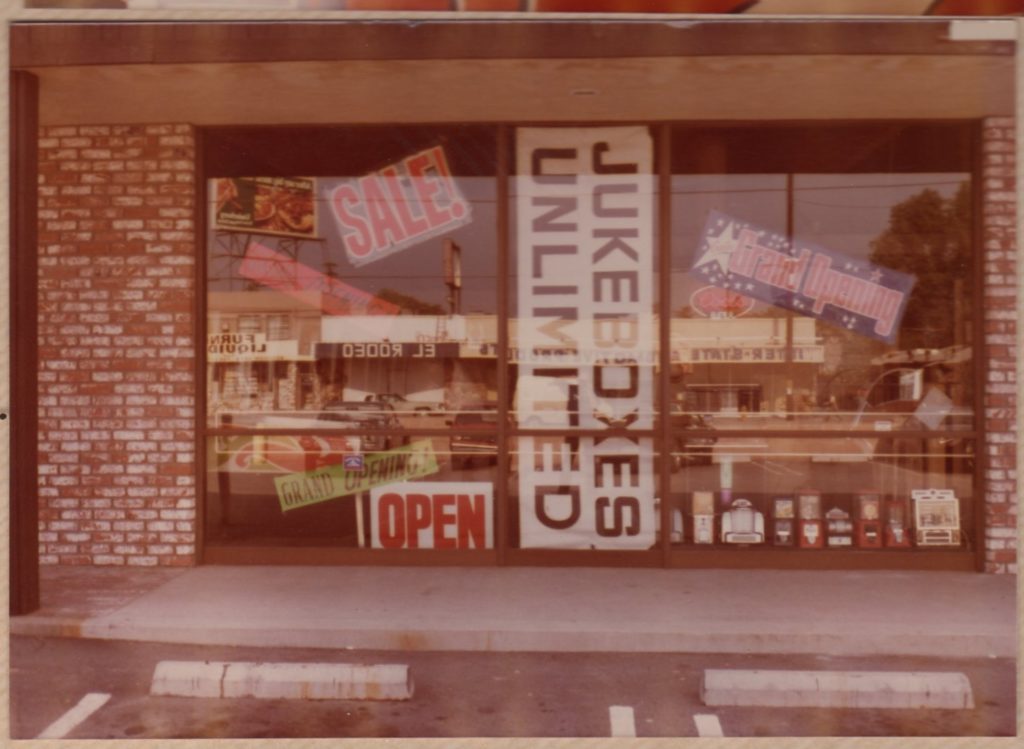
How did you adapt to the industry’s many changes over the past 50 years?
I’m fortunate enough to be in a niche industry. I basically took it out of the dark ages and made it into an actual business through advertising on television and in the Yellow Pages. When I started, operators were selling “reconditioned” 10-year-old jukeboxes to homes from their shops. My business isn’t reliant on any outside uncontrollable changes other than those of the demands of homeowners.
In these nearly 50 years of business, the only major change I have felt was the move from 45s to CDs. I don’t get involved in MP3, internet, downloading or touch screen. Even the closing of Wurlitzer and Seeburg, or the change of Rock-Ola’s hands or the joining of Rowe and NSM didn’t affect me other than my purchasing the entire Seeburg factory parts department in Chicago.
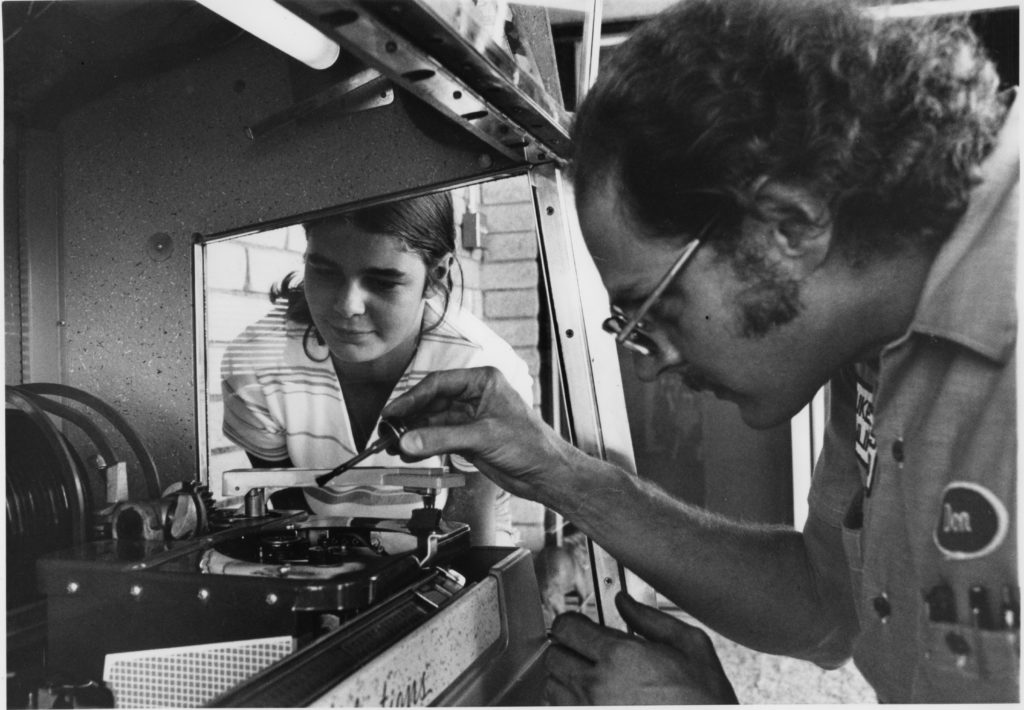 You’ve put Jukeboxes Unlimited up for sale. Why?
You’ve put Jukeboxes Unlimited up for sale. Why?
I’m 77 now and as much as I love this thriving business of mine, I’d like to make some changes in my life. I’ve stopped jumping over the side of my Ram 2500 truck or off the liftgate. Not sure if I can still make it to the ground in one piece!
I’ll keep the rental business and a portion of the parts department since my son loves this business, too. If I were 25 or 45 or even 50 years old and an opportunity like this came along, I’d jump on it. Twice I’ve been offered major bucks to be a 49 percent partner in my business.
But probably the biggest reason for wanting to slow down personally is what’s in the 1,100-sq.-ft. building behind my residence … records! It’s 445,000 7” 45s, 15,000 10” 78s, 30,000 12” LPs and 15,000 CDs. I intend to sort and sell them for the rest of my life, which of course will take longer than that.
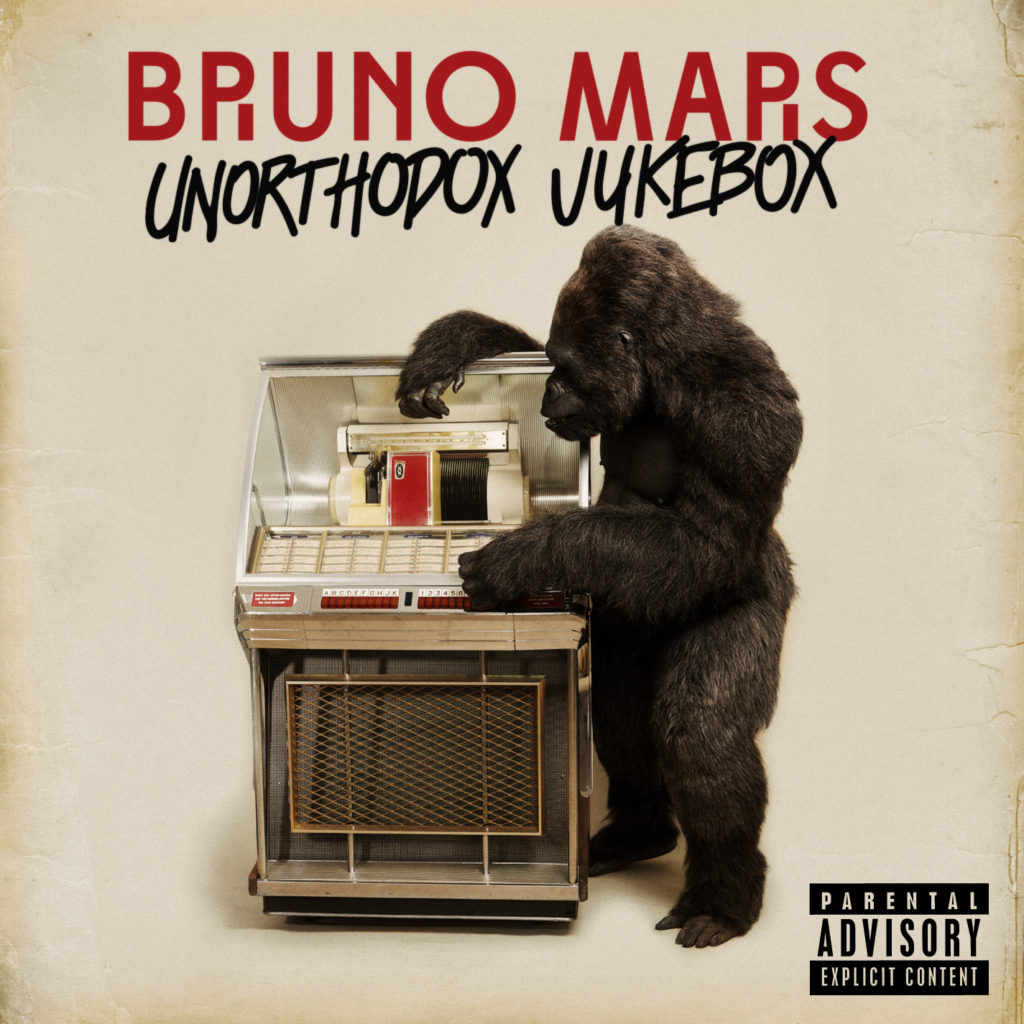
What’s the most important information you want to get across to a potential buyer?
I have a somewhat whimsical, nearly mystical, very unique, awfully fun, simply amazing, as well as highly rewarding, business in an industry I pioneered nearly 50 years ago. People tell me I have the “coolest business” and the “greatest job on the planet.” But to me it’s a labor of love.
I would tell a potential buyer that this is not rocket science. If you have a semblance of common sense, you’ll do just fine. If you enjoy working with your hands, hate your current job and want to be your own boss, you’re gonna love this job.
Every day is a new adventure and sometimes even a challenge. I’d do this job for free if I could. Heck, my neighbors, who all hate their jobs, tell me they would, too. Everyone everywhere loves jukeboxes. People’s eyes light up, a huge smile comes across their face and they gleefully tell you of their encounters and experiences through life with one or more of these beauties. Next thing you know, they’re asking all about the history and magical workings of these marvelous machines. Jukeboxes are loved in nearly every culture in the world because they play the international language of love and peace … music!
People say that if you love what you do, you’ll never work a day in your life. Does that sum up Jukeboxes Unlimited?
These decades have brought me so much excitement, pleasure and fun it’s hard to describe. I would love to see someone take over and continue the legacy of producing high-quality products born of American ingenuity while appreciating where it stands in our wonderful culture. You could continue to keep an American icon living on, well into the future. Not just in the history books, but in homes and businesses around the world.
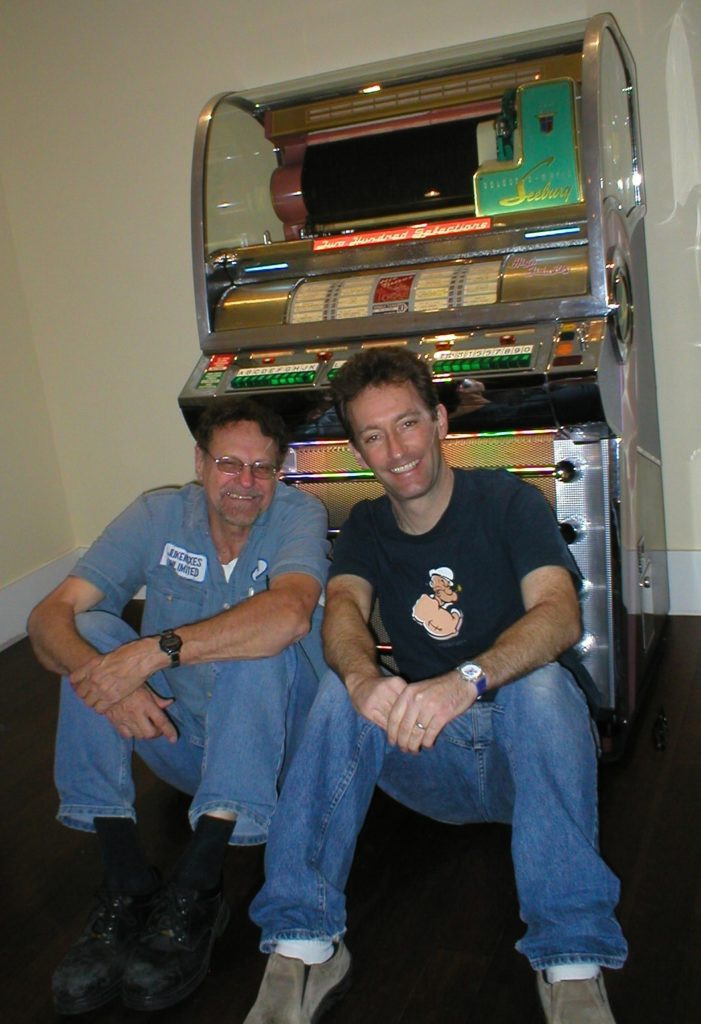
It’s clear you have quite a love affair with jukeboxes and your business. Do you have any final thoughts on the industry you’d like to share?
I can’t predict what’s to happen with the industry as a whole, but I can propose to have a good feeling about the future sales to private parties around the world.
First off, only the strong will survive in the home jukebox restoration businesses and we might be the strongest one around. Our U.S. competition is few and far between from coast to coast. If that weren’t so, why do we continue to have terrific sales around the world? Sometimes we have as many as 15 or more jukeboxes with deposits on them in queue being reconditioned at the same time.
Another thing is we don’t always “restore” jukeboxes to their original factory condition. In many cases, we “recondition” them to look and work better than they did when new. Most can’t see –– but can hear –– the differences. We also expect ours to run without any maintenance for decades to come. Like right now, I have no problem selling a 1962 Seeburg LPC-1 for $3,200 or a 1974 STD Vogue for $3,000, neither of which I pay anything for. I’ll buy a 1946 Wurlitzer 1015 for anywhere from $1,500 to $5,000 and sell it for a starting price of $17,500.
Jukeboxes will always be around with reminders of them in movies, TV shows and the hearts of people everywhere.
[Editor’s note: More than a sales pitch for his business, this feature is a testament to Don’s passion for the industry’s music box. Be sure to visit the Jukeboxes Unlimited website for a vast treasure trove of information from Don’s half-century in the industry.
If you find jukeboxes alluring and think you’d like to follow in Don’s footsteps, email him at [email protected] or call him at 818-366-9400. He wants potential buyers to know he’s invested in the continued success of the business, and will be available to help in any way he can.]

